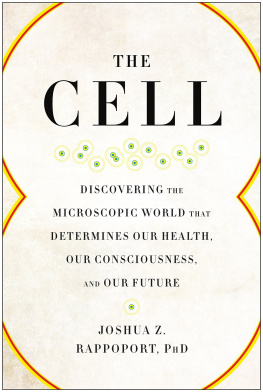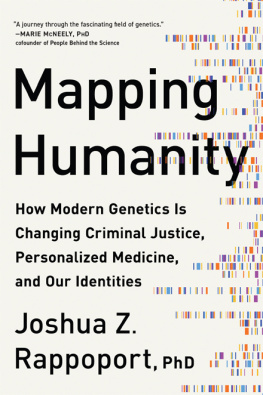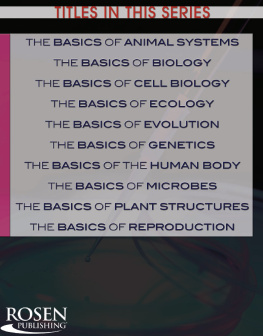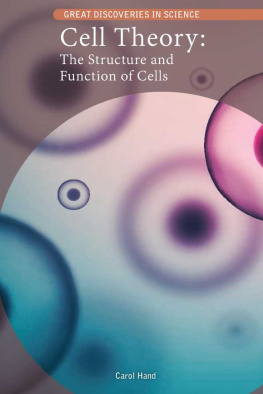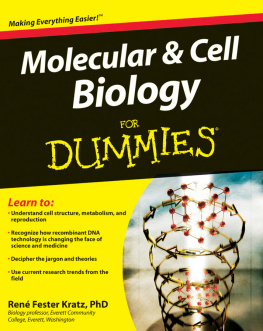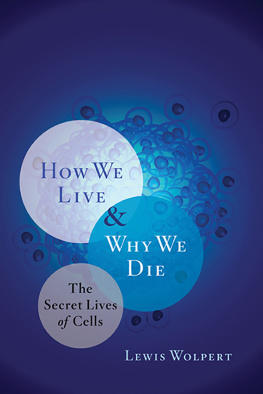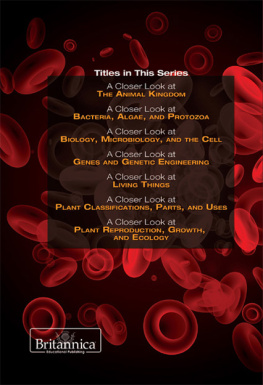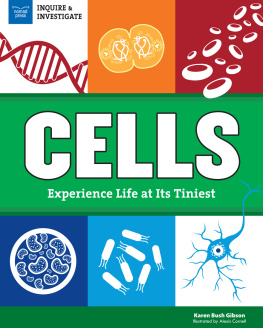
Praise for The Cell
Nicely conveys the historical background behind classical benchmarks in cell biology and the excitement of recent advances in visualizing the inner workings of our cells.
M ARK P ALLEN , MD, P H D , author of The Rough Guide to Evolution and professor of microbial genomics at Warwick Medical School, University of Warwick, UK
A birds-eye view of the amazing edifice upon which life was built, the cell. Joshua Z. Rappoport gives a brilliant account of how it works, how humans discovered it, and the consequences for life on earth. The authors enthusiasm for his subject shines through each page. So read this book with caution, because it might rub off on you!
S TEVE B USBY , FRS , professor of biochemistry at the School of Biosciences, University of Birmingham, UK
The Cell is a labor of love written by a young cell biologist seeking to share his fascination for the subject. Joshua Z. Rappoport raises our awareness to better know the significance of an otherwise seemingly academic topic, which touches every aspect of our humanity and future. He writes with a wry and entertaining style that at every opportunity reaches for real world analogies to illustrate accurately cutting-edge concepts in molecular cell biology.... Making sometimes complex ideas accessible to the non-scientist, Joshua Z. Rappoport is skillful to avoid alienating the biological scientist, who may even learn some new facts, testifying the thoroughly well-researched nature of this books contents. By recounting to the reader a string of fascinating anecdotes spanning the birth and discovery of modern molecular cell biology, The Cell bridges the chasm between stoic tertiary level up-to-date textbook and beautifully written inspiring philosophical prose, presenting a delightful muse on the microscopic world that matters more than we ever before imagined.
S PENCER S HORTE , P H D , group leader and director of Imagopole, Institut Pasteur, Paris
THE CELL
THE CELL
DISCOVERING THE MICROSCOPIC WORLD THAT DETERMINES OUR HEALTH, OUR CONSCIOUSNESS, AND OUR FUTURE
JOSHUA Z. RAPPOPORT, PHD

BenBella Books, Inc.
Dallas, TX
Copyright 2017 by Josh Rappoport
All rights reserved. No part of this book may be used or reproduced in any manner whatsoever without written permission except in the case of brief quotations embodied in critical articles or reviews.

BenBella Books, Inc.
10440 N. Central Expressway, Suite 800 | Dallas, TX 75231
www.benbellabooks.com
Send feedback to
First E-Book Edition: April 2017
Library of Congress Cataloging-in-Publication Data
Names: Rappoport, Joshua Z., 1974-
Title: The cell : discovering the microscopic world that determines our health, our consciousness, and our future / Joshua Z. Rappoport, PhD.
Description: Dallas, TX : BenBella Books, Inc., [2017] | Includes bibliographical references and index.
Identifiers: LCCN 2016046562 (print) | LCCN 2016053541 (ebook) | ISBN 9781942952961 (paperback) | ISBN 9781944648978 (electronic)
Subjects: LCSH: Cytogenetics. | BISAC: SCIENCE / Life Sciences / Cytology. | SCIENCE / Applied Sciences. | MEDICAL / Diseases.
Classification: LCC QH441.5 .R37 2017 (print) | LCC QH441.5 (ebook) | DDC 572.8dc23
LC record available at https://lccn.loc.gov/2016046562
Editing by David Bessmer
Copyediting by Scott Calamar
Proofreading by James Fraleigh and Chris Gage
Indexing by Debra Bowman
Text design and composition by Silver Feather Design
Front cover design by Brian Barth
Full cover design by Sarah Dombrowsky
Printed by Lake Book Manufacturing
Distributed by Perseus Distribution
www.perseusdistribution.com
To place orders through Perseus Distribution:
Tel: (800) 343-4499
Fax: (800) 351-5073
E-mail:
Special discounts for bulk sales (minimum of 25 copies) are available. Please contact Aida Herrera at .
Throughout each stage of scientific training, one gets to work alongside more experienced supervisors who lead us, for better or worse, by example. I have been extremely lucky to have the pleasure of working with a series of unbelievably capable, giving, and thoughtful mentors throughout the last twenty-five years.
While I was an undergraduate at Brown University, I took several classes with Professor Don Jackson and did a series of research projects in his lab. A first-class empiricist, Dr. Jackson instilled in me an appreciation of the order inherent in the natural world and taught me that every repetition of an experiment must be performed absolutely identically. My PhD supervisor at Mount Sinai School of Medicine was Professor Ruth Abramson, who, sadly, passed away in 2004. Dr. Abramsons work ethic and moral fiber served as an example not only to those lucky enough to be among her students, but to all who knew her.
After my PhD, I had the honor and privilege to work with Professor Sanford Simon at the Rockefeller University. More than anyone else, Sandy is responsible, for good or ill, for the scientist that I am today. Sandys laser-sharp focus, genuine excitement for science, and excellent sense of humorcombined with his absolutely rigorous focus on quantification and statistical analysis and the importance he places on the happiness of the people working in his labshaped me in numerous ways. Sandy sees that everyone is an individual who cant be expected to fit some unrealistic ideal mold. He recognizes that key contributions can be made equally by both the high schoolstudent intern and the visiting professor. The perspective that each scientist is a person, not a cog in a machine, and that a lab works best when people get along together, rather than compete for the bosss attention or the lead role in the next big project, is sorely lacking in science today, but is exemplified by Sandy.
These people, these excellent scientists and caring educators, gave of their time to help train me, and for that I am eternally grateful. Science involves the ability to read the literature critically, to employ reasoning and logic as well as technical skill. Each of these three mentors worked very hard to help me develop these attributes. That is why I dedicate this book to Sandy Simon, Don Jackson, and the memory of Ruth Abramson, each of whom contributed to my education and growth as a scientist and a person.
When you employ the microscope, shake off all prejudice, nor harbor any favorite opinions; for, if you do, tis not unlikely fancy will betray you into error, and make you see what you wish to see.
H ENRY B AKER , 1742
Contents
The world of biomedical research moves at breakneck speed. It seems as if we hear about new breakthroughs almost daily. Everyone cares about new discoveries, because they affect our health and longevity. Moreover, this kind of news not only has to do with causes, diagnosis, and treatment of disease, but sometimes suggests ways in which we should change our behavior, diets, and lifestyles. In fact, its those latter itemswhat you can do to live longer and healthierthat tend to be most sensationalized, exaggerated, and misunderstood.
Whether you are talking about obesity, aging, infectious diseases, cancer, or improving your Sudoku abilities, it all comes down to cells and the molecules they create and that regulate them. Thus, one of my purposes for writing this book is to give the average person a better understanding of the basic science of cellular and molecular biology so that you can evaluate more critically what you hear and read. Another is to lead you through one of the most thrilling and fascinating modern frontiers of human discovery, in particular from the perspective of a microscopist armed with the most powerful means to visualize events at the cellular and molecular scale.
Next page
